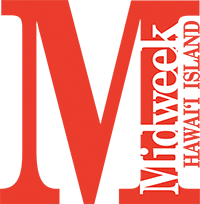The Center of Attention
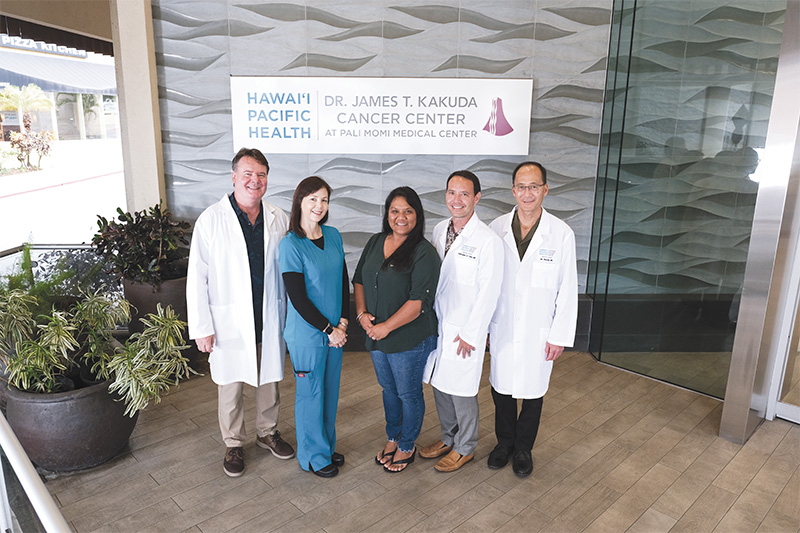
Standing in front of Dr. James T. Kakuda Cancer Center at Pali Momi Medical Center are (from left), Dr. Jeffrey Killeen, nurse navigator Noe McGuire, cancer survivor Celeste Sanchez, Dr. Christopher Tokin and Dr. Ian Okazaki.
Five years after its opening, Dr. James T. Kakuda Cancer Center at Pali Momi Medical Center remains a standard for high-quality centralized care.
Named after a visionary physician whose dream became a reality, the Dr. James T. Kakuda Cancer Center at Pali Momi in ‘Aiea celebrated its five-year anniversary on Oct. 30.
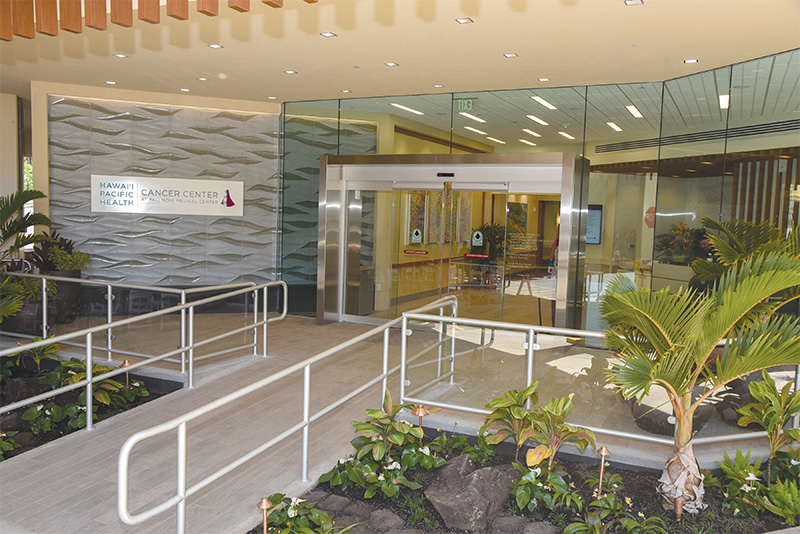
The entrance to the Dr. James T. Kakuda Cancer Center. PHOTO COURTESY HAWAI‘I PACIFIC HEALTH
Currently, it’s the only center in Central and West O‘ahu that is nationally accredited by the American College of Surgeons Commission on Cancer.
In addition, the Pali Momi cancer center has established partnerships with Cancer Center of Hawai‘i and University of Hawai‘i Cancer Center. It is also a member of the Fred Hutchinson Cancer Center’s Network Program, which connects community-based physicians with the latest research and treatment options from world-renowned experts.
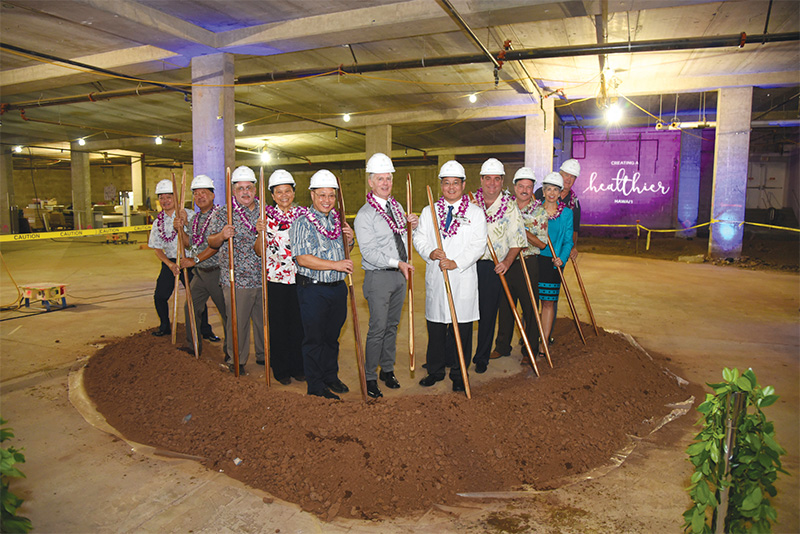
Participants gather at the center’s groundbreaking ceremony.PHOTO COURTESY HAWAI‘I PACIFIC HEALTH
Located on 24,000 square feet, Dr. James T. Kakuda Cancer Center provides a full-spectrum of services in a centralized location — freeing patients from the burden of traveling into town or off-island for care. The newest addition to the center is a multidisciplinary clinic that opened in March 2021 and has already welcomed more than 7,100 patients.
A few physical features of the center include specially designed exam rooms for specific types of cancer and procedures, a complete infusion suite, onsite pharmacy and lab services, a state-of-the-art conference center and a dedicated telehealth suite.
Playing a leadership role on the care team is Dr. Jeffrey Killeen, a pathologist and medical director of the Hawai‘i Pacific Health oncology service line.
“While it’s certainly true and important that we have a beautiful center that’s pleasant to be in, that’s comfortable, it should never be forgotten that the goal is to have the highest-quality, evidence-based care given. That comes with the people you bring in,” Killeen notes.
“It’s multidisciplinary and subspecialty focused, because you need to have a certain footprint to do that. It’s patient-centered, as opposed to the traditional model where patients go from office to office to office, maybe across town,” he adds. “Instead, the doctors come to the patient. So, it’s much preferred by the patient.
“It’s also been shown to lead to better outcomes, because you can make decisions as a group.”
Radiation oncology therapy is provided through Cancer Center of Hawai‘i, which relocated its Leeward O‘ahu campus — formerly sited in ‘Ewa Beach — to the Kakuda center in 2017 following its opening.
This partnership provides access to advanced care services for the residents of West O‘ahu and allows the opportunity for Cancer Center of Hawai‘i and Hawai‘i Pacific Health to combine their respective areas of expertise for a level of coordinated cancer care not previously available on the Leeward side of the island.
Meanwhile, knowledgeable nurse navigators, such as registered nurse Noe McGuire of the Kakuda center, are one crucial point of contact in the system of care. For example, nurse navigators connected patients to opportunities for more than $1.66 million in financial assistance last year alone.
“As everyone knows, it is difficult just navigating your way through the medical system, but to have a diagnosis of cancer on top of it is stressful to say the least, and most patients are in shock,” Mc-Guire elaborates. “So, really what a nurse navigator does is connect as close as diagnosis with the patient, ensuring they understand the diagnosis, what the next steps entail, to be a resource they need from diagnosis, throughout survivorship and years beyond.”
McGuire also explains that because there are multiple different types of cancers, there are many nurse navigators who all have their own specialty skills.
She also emphasizes that nurse navigators don’t have to do everything by themselves, because there is such a team effort with support among colleagues. In addition to the key role that nurse navigators play, the center also offers patients specialized support groups focused on their type of cancer — which are currently held virtually.
Dr. Ian Okazaki is a well-known medical oncologist with Hawai‘i Pacific Health cancer centers, which includes the Kakuda facility. He says that he’s very satisfied with his choice of career and work environment.
“It’s always rewarding because you’re helping people along their journey. It’s a collaborative effort between you and the patient and the family. It’s what draws people into oncology,” Okazaki says. “It’s that closeness, that intimacy, that you might not see in a lot of subspecialties.”
He adds that part of his role is “harnessing all that energy and putting it toward the patient and family to get them through whatever their needs are.”
Citing just a few statistics, in 2021 alone, the Pali Momi cancer program provided 28,594 screening mammograms, 8,778 hematology/ oncology appointments and 15,860 infusion appointments.
Among those who have been helped is survivor Celeste Sanchez. She emphasizes that she’s extremely grateful for the services she’s received at the Kakuda center, particularly since it’s been a one-stop shop for her. Sanchez shares that she’s been treated for lobular carcinoma, which is a type of breast cancer.
“I did all my mammograms at the women’s health center,” explains Sanchez. “I did my chemotherapy, my radiation and my blood draws here at the cancer center. I still come to the cancer center once a month. I do a maintenance shot for five years. So, it’s been really convenient. I live in Pearl City and I don’t have to go all over to do different appointments.”
She also explains that the comprehensive team who have been treating her at the cancer center have been instrumental in her well-being.
“It’s a family over here. They became my family. It was awesome. My mom was diagnosed with breast cancer of the same type, too, so we both did it together here.”
Sanchez concludes that the people, the advanced high-quality care and the facility combined are some of what make Dr. James T. Kakuda Cancer Center such a comforting environment for patients.
“Everybody’s so nice over here. So, it made it really easier for us to go through it,” she says. “Coming to a facility that is so caring and loving makes it easier for the patients, you know?”
KAKUDA: A Visionary Leader
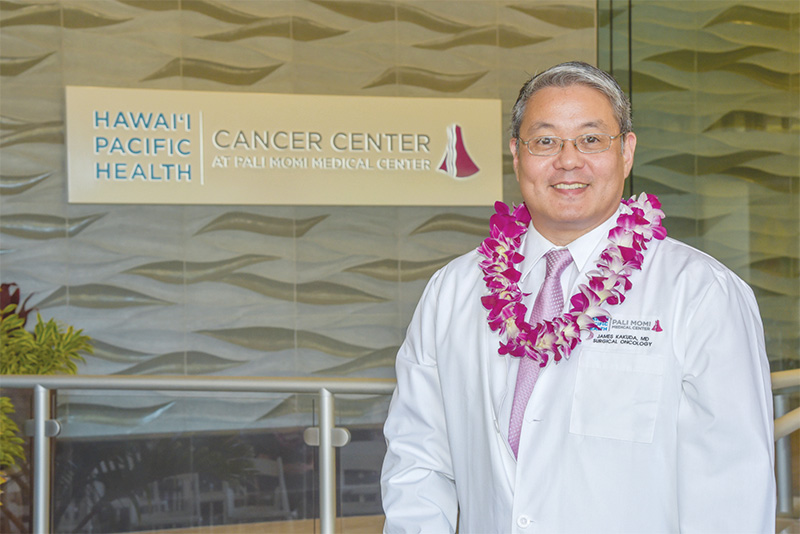
DR. JAMES T. KAKUDA
The Dr. James T. Kakuda Cancer Center at Pali Momi Medical Center is named in honor of the late Dr. James Kakuda, a beloved surgical oncologist, former chief medical officer and chief of staff at Pali Momi, who passed away unexpectedly in 2018.
Kakuda envisioned a center that would provide the West and Central O‘ahu with a full spectrum of cancer services and access to expert care specialized for the patient’s exact cancer condition.
Putting his ideas into words, the late Kakuda stated, “The need for comprehensive and coordinated care continues to increase in our community. It’s unfortunate that cancer continues to impact so many lives, but the advancements in technology and treatments are helping more people fight this disease.
“The coordination of cancer care for patients can be complex, and this new center will help to alleviate that burden for patients residing in Central and West O‘ahu by providing one convenient location for all of their care needs,” he added.
Nurse navigator Noe McGuire has worked at the Pali Momi medical center for nine years, so she’s been there for the Dr. James T. Kakuda Cancer Center groundbreaking, opening and beyond.
“I’ve had the honor and privilege of working with Dr. Kakuda, who was just a fabulous person. But his vision really was that cancer patients have a one-stop shop … I think his vision was just incredible,” McGuire says.
Dr. Jeffrey Killeen, a pathologist and medical director of the Hawai‘i Pacific Health oncology service line, remembers, “I actually was involved in recruiting Dr. Kakuda, who this center is named after, because we were wanting him to join us. When I interviewed him, I remember very clearly that he had the exact vision that I had been thinking that we know is the best — which could be summarized as multidisciplinary care — meaning all different specialties involved. And that it has a subspecialty focus. There’s a lot of data showing that gives better outcomes, if you give that specialized care.”
